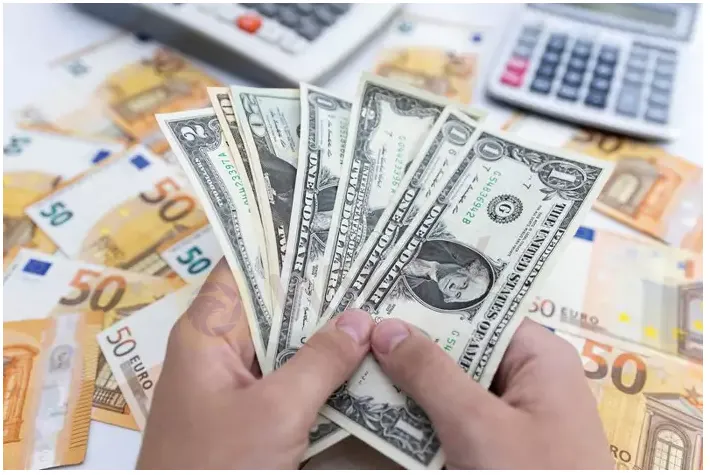简体中文
繁體中文
English
Pусский
日本語
ภาษาไทย
Tiếng Việt
Bahasa Indonesia
Español
हिन्दी
Filippiiniläinen
Français
Deutsch
Português
Türkçe
한국어
العربية
Euro under pressure as inflation fears send investors to dollar haven
Abstract: The euro struggled to regain a footing on Thursday, having tumbled overnight against a resurgent U.S. dollar, which benefited from safe-haven demand on renewed worries about higher rates and a global recession.

SINGAPORE/HONG KONG (Reuters) – The euro struggled to regain a footing on Thursday, having tumbled overnight against a resurgent U.S. dollar, which benefited from safe-haven demand on renewed worries about higher rates and a global recession.
The euro was at $1.044, after losing 0.75% on the dollar the day before, and heading for a monthly decline of 2.7%.
It also dropped to a fresh 7-1/2-year low versus the Swiss franc at 0.99663 francs, with the Alpine currency another beneficiary of safe-haven flows and also still basking in the afterglow of the Swiss National Banks surprise rate hike two weeks ago.
Christopher Wong, senior FX strategist at Maybank, attributed the euros fall against the dollar to the market moving away from riskier assets after “central bankers warned of lasting inflation and that they would prioritise combating (it), resulting in broad dollar rebound overnight.”
A steady and aggressive global switch to tighter policy has stoked recession worries and shaken financial markets in recent months.
Speaking at the European Central Banks annual conference in Sintra, Portugal, U.S. Federal Reserve Chair Jerome Powell said it was important to bring down inflation, even if it meant economic pain, with similar remarks from ECB President Christine Lagarde.
Lower German inflation figures also briefly weighed on the euro, said Ray Attrill head of FX strategy at National Australia Bank, before “the market realised that there was some special factors there, it wasnt a genuine downside surprise.”
“The bigger picture worry is what happens with energy supplies in the eurozone as we head towards the winter… Were quite cautious about the euro,” Attrill added.
The dollar was also on the front foot against other majors, with sterling hunkered down at $1.21225, with losses this week leaving it set for a 3.8% monthly decline, while the Australian dollar was struggling at $0.6873.
The dollar also hit fresh a 24-year peak of 137 yen overnight, as the gap between a hawkish Fed and a dovish Bank of Japan continues to weigh heavily on the yen, which was last trading at 136.57 yen.
The BOJ is able to keep interest rates pinned down because Japanese inflation is still low by global standards, though even small price rises are causing a messaging problem for the central bank.
The dollar index, which measures the greenback against six peers, was at 105.19, a two week high.
Bitcoin, dipped back below the symbolic $20,000 level on persistent market ructions, and was also hurt by the U.S. Securities and Exchange rejecting a proposal to list a spot bitcoin exchange-traded fund by Grayscale, one of the worlds biggest digital asset managers.

Disclaimer:
The views in this article only represent the author's personal views, and do not constitute investment advice on this platform. This platform does not guarantee the accuracy, completeness and timeliness of the information in the article, and will not be liable for any loss caused by the use of or reliance on the information in the article.
Read more

RM5.9M Lost to "Davidson Kempner Capital Management" Facebook Scam
A private contractor in Malaysia faced a devastating loss of over RM5.9 million after falling victim to a fraudulent investment scheme promoted on Facebook. Tempted by the scheme’s impressive claims and credentials, the victim began investing in September 2024. The investment process required him to download an application called A-Trade, which was readily available on the Apple Store.

Is There Still Opportunity as Gold Reaches 4-Week High?
Gold Continues to Rise, can the Bulls Keep Going? Recently, gold prices have been on the rise, especially following the release of the non-farm payrolls data, as demand for gold as a safe-haven asset continues to increase.

This Economic Indicator Sparks Speculation of a Japan Rate Hike!
The latest data shows that Japan’s base wages in November rose by 2.7% year-on-year, marking the largest increase in 32 years, fueling speculation about a potential BOJ rate hike, but Governor Kazuo Ueda’s dovish remarks in December have shifted market expectations toward a potential delay in policy adjustments.

Challenge Yourself: Transform from Novice to Expert
From a forex novice to a trading expert, all it takes is this one opportunity! Join us for the Forex Beginner's Advancement Journey challenge and unlock your potential! Here, if you're a beginner, participating in the event and posting on selected topics will not only deepen your understanding of forex basics and help you advance but also earn you a Learning Encouragement Award. For those with some experience in forex, discussing insights under the event topics will allow you to exchange experiences and share techniques with like-minded peers, while also having the chance to win a Perspective Sharing Award! Come challenge yourself and break through the limits of forex trading together!
WikiFX Broker
Latest News
SQUARED FINANCIAL: Your Friend or Foe?
Big News! UK 30-Year Bond Yields Soar to 25-Year High!
ACY Securities Integrates MetaTrader 5 to Enhnace Copy Trading Service
Soegee Futures Review: Should You Trust This Broker?
Malaysian Pilot Loses RM1.36 Million in UVKXE Investment App Scam
Indonesia officially joins the BRICS countries
Attention! Goldman Sachs Cuts Gold Target to $2910
Inflation Rebounds: ECB's Big Rate Cut Now Unlikely
Carney \considering\ entering race to replace Canada\s Trudeau
High-Potential Investments: Top 10 Stocks to Watch in 2025
Currency Calculator






